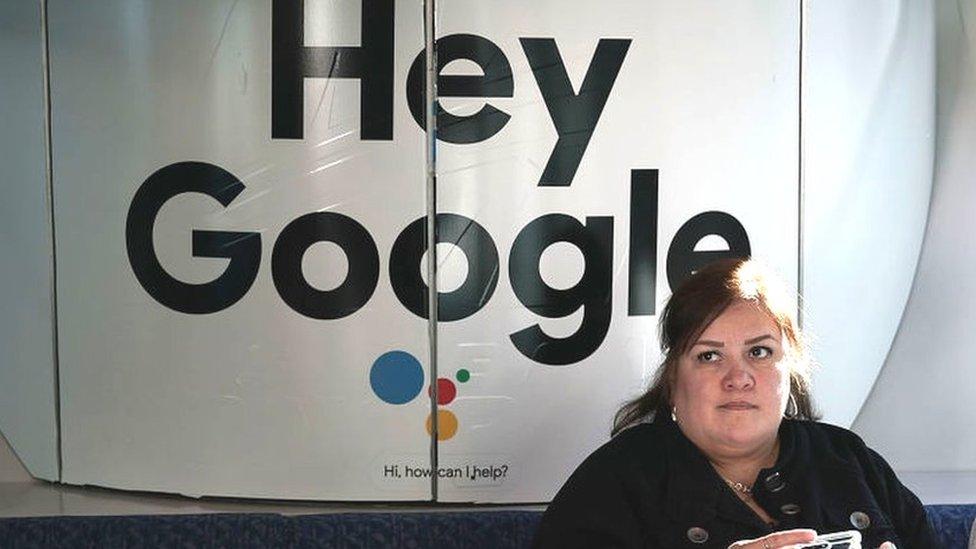CES 2019: Amazon and Google Assistant carve up tech expo
- Published

Alexa and Google Assistant aren't clamouring to be heard, they're clamouring to be spoken to
At CES, there's no shortage of gadgets to talk to. Smart TVs, cars, pianos - and even a toilet - these are just some examples of devices that come with voice-activated helpers.
No matter who makes the hardware, the virtual aide linked to or packaged inside is likely to be one of two: either Amazon's Alexa or Google Assistant.
For ShadeCraft, external, the maker of a new device that lets garden parasols be controlled by voice, Alexa was simply more straight-forward to build in.
"It was much easier and simpler to integrate," explains chief executive Armen Gharabegian. "But we have been testing Google voice as well."
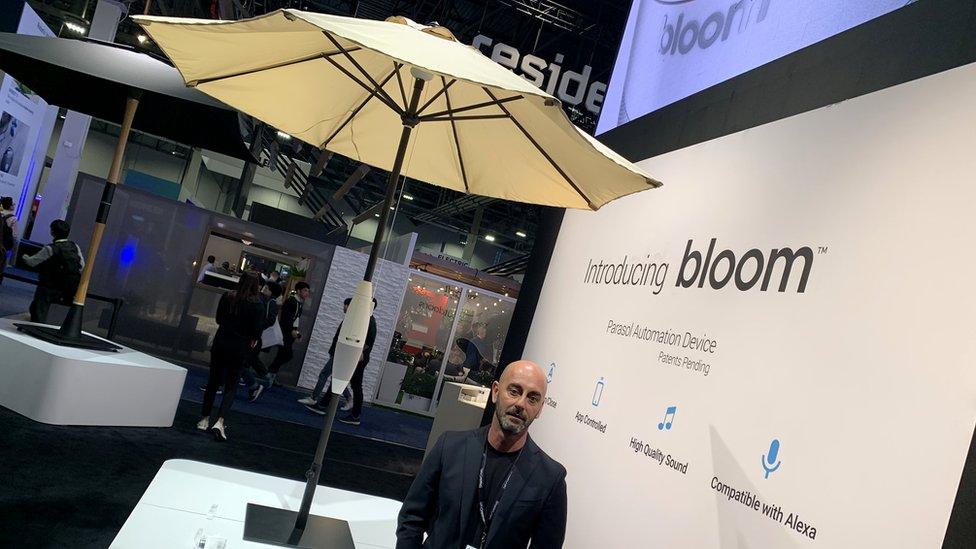
At last, a parasol you can talk to
Users can ask Alexa to open or close the sunshades mechanically, or play music via Bloom's speakers. But ShadeCraft wants to integrate Alexa completely, so that the parasol behaves just like an Amazon Echo smart speaker.
Voice commands such as ordering Amazon products or asking what the weather will be like could then be done from the patio as well as the living room.
Amazon has made it hassle-free to add Alexa to products, by offering the assistant on a single chip, external - the Alexa Connect Kit.
It has been available for a few months now, but at CES Google just announced their equivalent tool with a strikingly, external similar name - Google Assistant Connect.
However, any product using that chip will have to wirelessly connect to a Google smart device, which will process voice data.
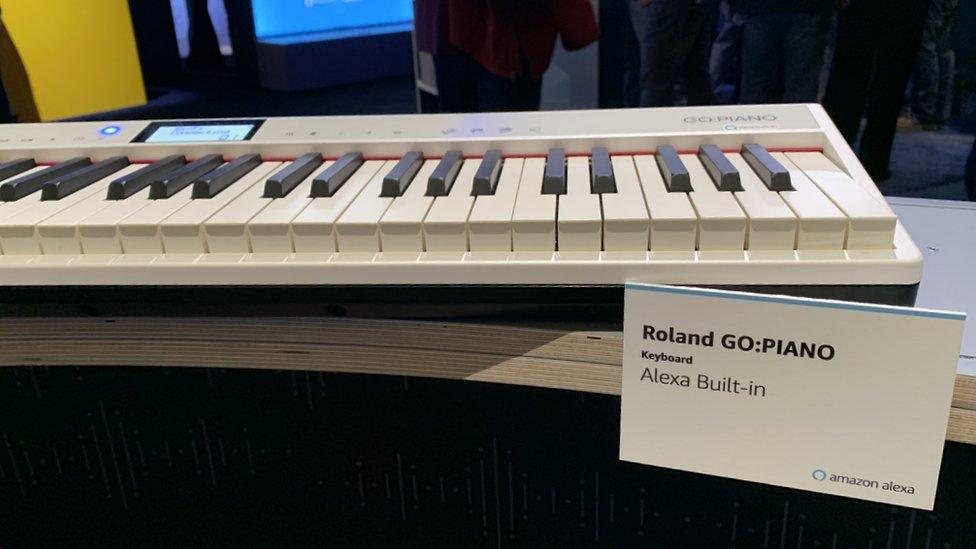
Roland has showcased a digital piano that also houses Alexa
Still, in time, Bloom customers may be able to choose to talk to Google Assistant instead of Alexa.
"I think that we are perfectly positioned to be the extension of the AI hub outdoors," said Mr Gharabegian.
The benefit of this would be to give users access to the particular functionality offered by different virtual helpers.
Google Assistant, for example, tends to be better at answering queries about the wider world than Alexa. It also has exclusive access to some of the search firm's other products, letting users control Chromecast audio streams or display YouTube and Google Maps on devices with screens.
Alexa, by contrast, is more widely supported by third-party products and has more apps.
Another firm that thinks its customers may be best at deciding how to interact verbally with its devices is Sonos.
It has shown off a prototype smart speaker that allows users to select either Alexa or Google Assistant, though it isn't possible to activate them both at the same time.
Part of the problem is that interacting with multiple virtual helpers through one device could get confusing.
"Say an alarm goes off on the speaker," writes Dieter Bohn at tech site The Verge, external. "You might not know whether it was Alexa or Google that set it off, and you'd be stuck guessing which one to ask to stop while it beeps."
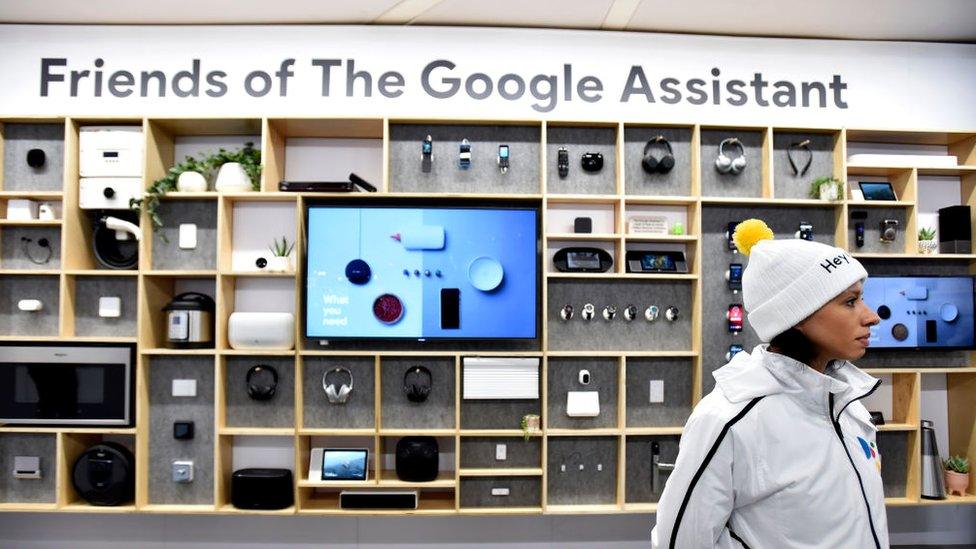
Google Assistant is also on a mission to conquer your home
However, in time, people may well become accustomed to using both assistants interchangeably, and even others like Apple's Siri or Samsung's Bixby, depending on what they want to do.
"[Consumers] will be entrenched in one of those ecosystems and so the manufacturer of appliances is not going to want to lose sales to consumers who prefer one of them," says Ross Rubin at market analysts Reticle Research, external.
First-mover advantage
But for now the land grab is everything, which is why executives at Amazon must be feeling pleased with Alexa's progress.
Amazon is estimated to have 41% of the global smart speaker market, external while Google comes in second, taking 28%. Alexa's dominance is visible across a wide range of other products too.
"Alexa had made the first-mover advantage and for a few years, that was the dominant integration technology at CES," explains Mr Rubin. "Google has stepped up its presence year after year."
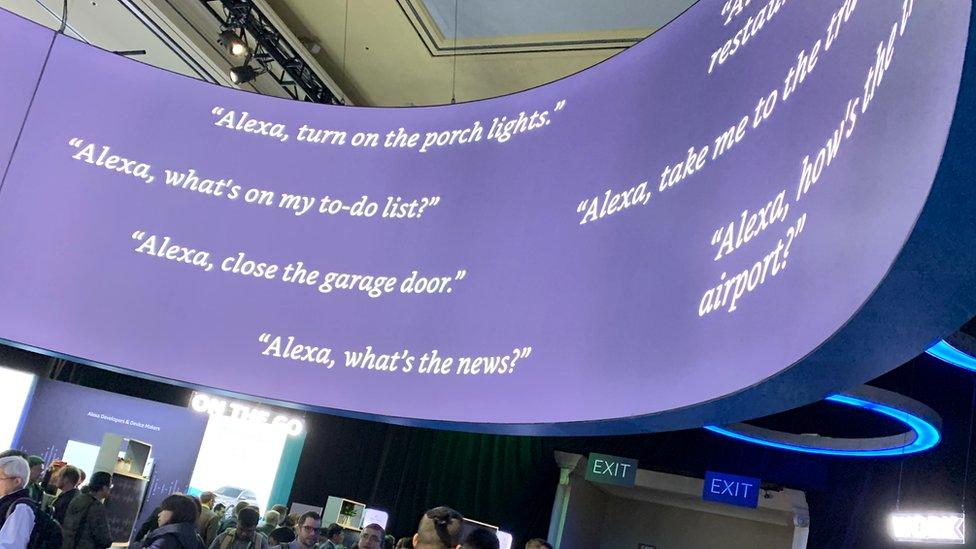
There are signs everywhere at CES that Alexa is still top dog in the voice assistant space
Some, though, remain sceptical that voice assistants add much value to most products.
"They're putting Alexa in everything and I'm getting a little bit tired of it," one user-interface specialist from a major car-maker told the BBC at CES.
"If I want to open my toilet why should I tell Alexa to open my toilet instead of opening it myself?"
The specialist, who wishes to remain anonymous, noted how the "sheer force" of Amazon's marketing was particularly noticeable at the tech trade show this year.
One other CES attendee concurred, tweeting:, external "To say that Amazon Alexa is everywhere at CES in Las Vegas would be an understatement."
Mr Rubin thinks that there are certain gadgets where the benefit of hands-free control does make sense.
Take kitchen appliances, for instance.
Instead of trying to finger a recipe book or smartphone with - literally - butter fingers, you can ask a voice assistant to call out the directions or repeat something if you need to hear it again.
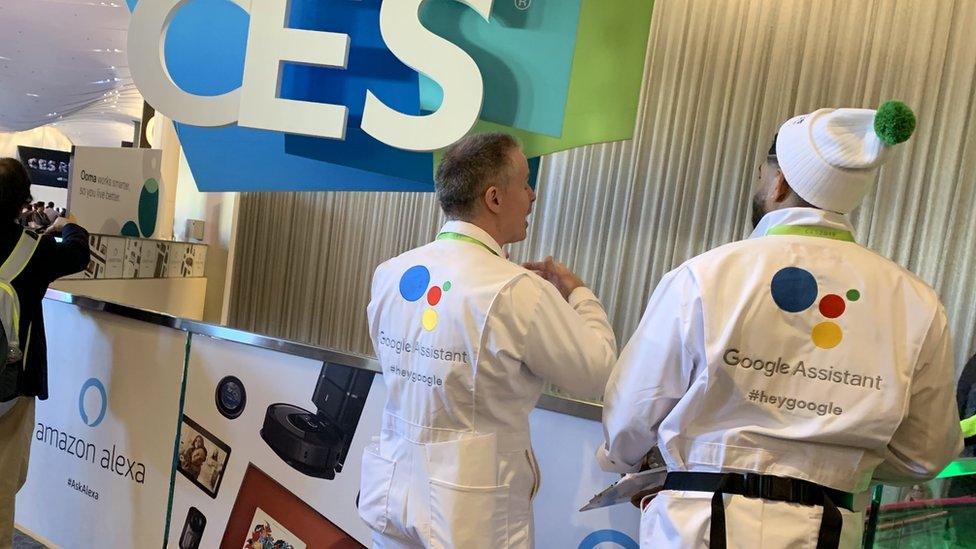
Google and Amazon have both deployed small armies of promoters to answer questions about their products
The hands-free use case applies to Focals - a new range of stylish smart glasses made by Toronto-based firm North, external.
Focals project a colour display into the wearer's eyeball by bouncing it off the lens to create a hologram-like visual in the right eye. This is used to relay text messages or directions to a place, for instance.
"The result that you get is a small transparent display that sits about an arm's length in front of you," says spokesman Alexander Ingram.
With Alexa and a speaker on board, there's another option - just listen to the information instead.
North received investment from Amazon and so has built Alexa into Focals - but Mr Ingram says there are no plans to keep the glasses as an Alexa-only product.
"By being able to take these assistants out of the home and into the world, that just opens up a huge range of new applications," he said.
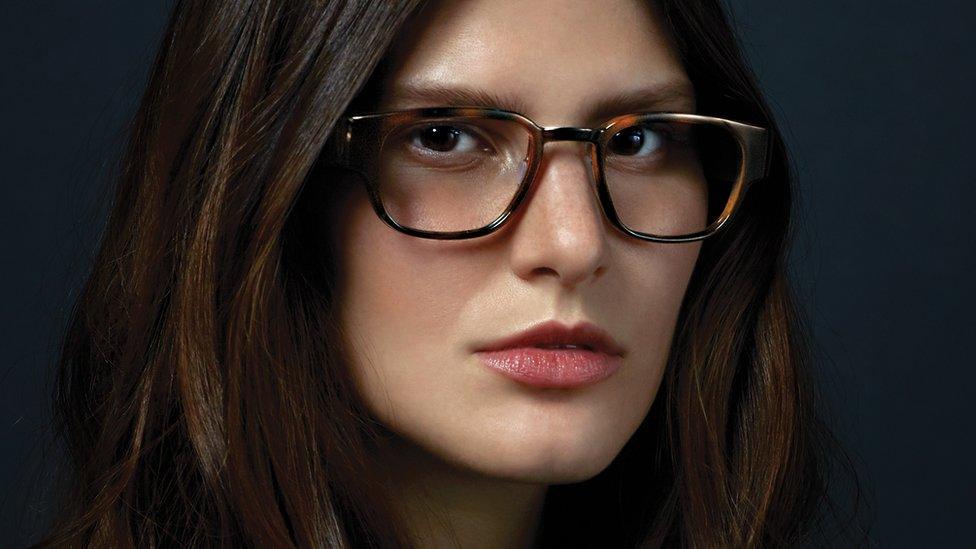
North's Focals smart glasses are designed to look just like normal glasses
There is another way to bring voice activation to a product without having to rely on one of the tech giants' assistants.
Snips, external lets firms build their own voice tools that run solely on the devices they were intended for.
So, if you want to make a coffee machine that simply responds to a handful of crucial commands, it would be an option.
What's more, by not relying on Amazon's or Google's servers, users would not need to bother connecting their new coffee machine to the cloud before asking it for a cappuccino. And that avoids the risk of a cyber-security scandal or other privacy issue.
"This kind of information should stay in your home, it should not go elsewhere, to a server on the opposite side of the world," said the firm's vice president of product, Sebastien Maury.
Read and watch all our CES coverage at bbc.com/ces2019
- Published20 December 2018
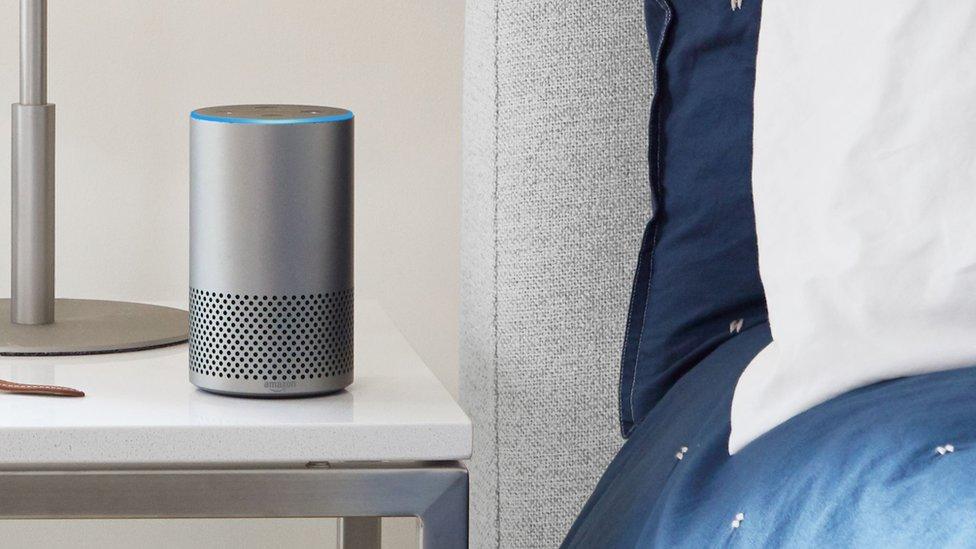
- Published28 June 2018
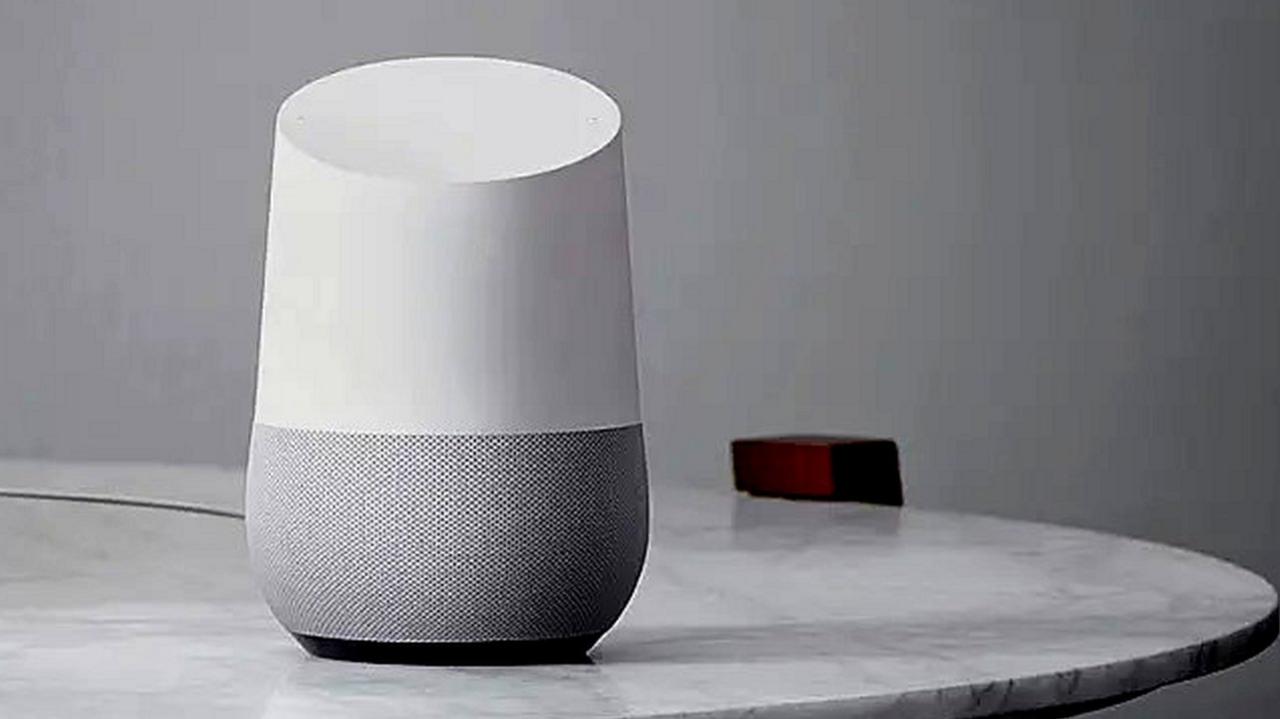
- Published10 January 2018
